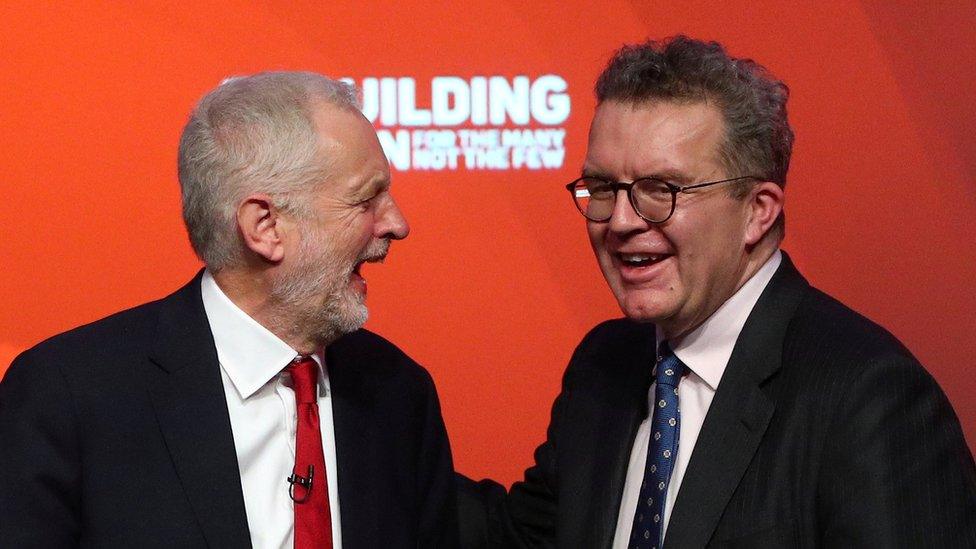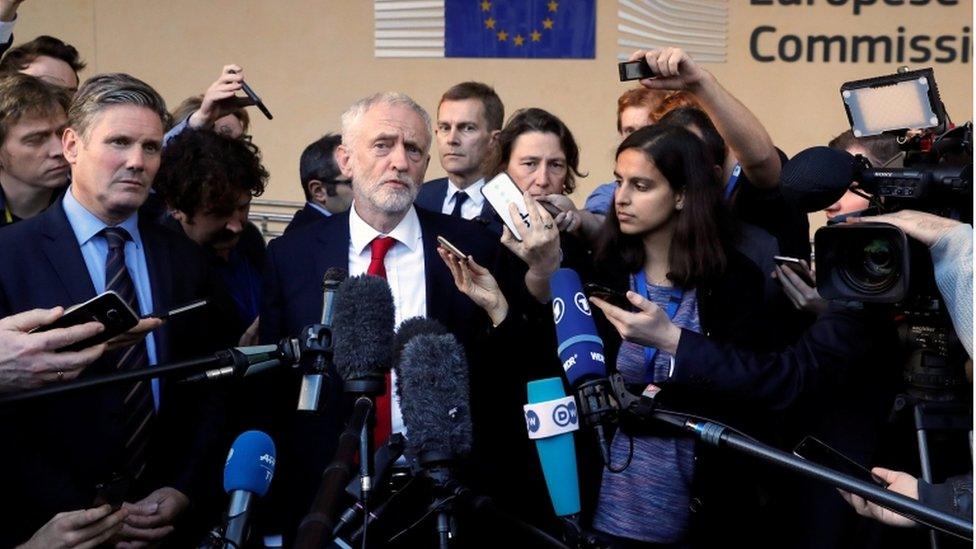Why not join a customs union?
- Published

Jeremy Corbyn laughs with Tom Watson, his deputy, at Labour conference
Labour came a little further out on Brexit this week.
If there is a deal, they say, that they might support. If we agree to keep a lot of the EU rulebook and join a so-called "customs union" with the EU, they will back the prime minister in the Commons.
This was a little new. Labour's longstanding position is that there are six tests they would apply to any deal struck by the government. If they meet them, they would support the government in a vote.
But they appeared, bluntly, to be unmeetable. So it was striking that Mr Corbyn explicitly said that there is a combination that, in his view, would meet the criteria.
What does Labour want?
A common rulebook: In short, this means things like worker protections. But also that get sold in the UK are things that could generally be sold in the EU. That means that you would not need border controls between the UK and EU to make sure that, for example, people aren't importing food into the EU from the UK that contravenes European law. A common rulebook would reduce border costs in trade with the EU.
A customs union: This would be an agreement whereby we would agree to remove all tariffs on goods traded between us - but also agree to charge the same tariffs on third countries. If we both agree to charge the same tariffs on Chinese goods, say, it means that the EU no longer has to check British goods to check we are not being used as a back-door route by Chinese companies to the EU that avoids their tariffs.
Taken together, these proposals are about minimising border problems in and out of the UK. Together, they could plausibly be the basis of a fix on the Irish border question.
There are also reasonable economic grounds for this strategy. As Sam Lowe, a trade expert at the Centre for European Reform, has written, external: "The UK is an intermediary manufacturer - one that imports to export - and the EU is, and will remain, the UK's most important trading partner". Reducing border friction is a reasonable ambition.
But one of Labour's six tests is that Labour says it must deliver the "exact same benefits" as we currently have as members of the single market and customs union. This proposal would not do that.
Customs union problems
First, we have to assume we will be aligning with the EU's customs agreements. They are not going to be aligning to us.
But we will not automatically get the export benefits of European trade agreements. So we have to let Korean goods in which meet the terms of the EU-Korea trade deal, as though we were still in the EU.
But Korea can treat our goods like we are just some third party with no preference. We would have to negotiate a parallel deal with Korea for that. I am not clear Korea would feel they have much to gain, given they would have free rein to sell us goods.
Second, there is an idea in trade known as "cumulation". At the moment, if a European car is sold into Korea, it benefits from the EU-Korea free trade agreement if it is 55% EU-made. Imagine a car that is currently 70% EU-made, with 20% coming from the UK. So if we leave with no deal, that car no longer counts as "European".
We could sign a deal that lets our 20% of that car "count" as European - a deal with both the EU and Korea. But both parties might lack interest in such a deal.
Third, it would rather undermine our ability to have much of our own trade policy.
If we cannot reduce tariffs and cannot allow products in that are currently banned under EU law, the Department for International Trade would have little to offer to win greater access to other markets for UK products. (This is, economically, a smaller problem than is popularly supposed, even if the politics of it are tough.)
Labour want to have a say in the EU's ability to strike deals that do not work for us. They would hope to be able to mitigate or head off some of these issues for future trade agreements - but it would be tricky for existing ones.
And while I am sure that some consultation process could be sold to Brussels, I would be quite sceptical that the Commission would let a third party bind their hands on a core area of EU business. Brexit, after all, means Brexit.
This may all be rather academic; it would be extraordinarily hard for the prime minister to swing to proposing a customs union. I would also be sceptical that Labour would ever vote for such an agreement. In the end, why help the government out, when you could fracture them?
- Published27 September 2018

- Published25 September 2018